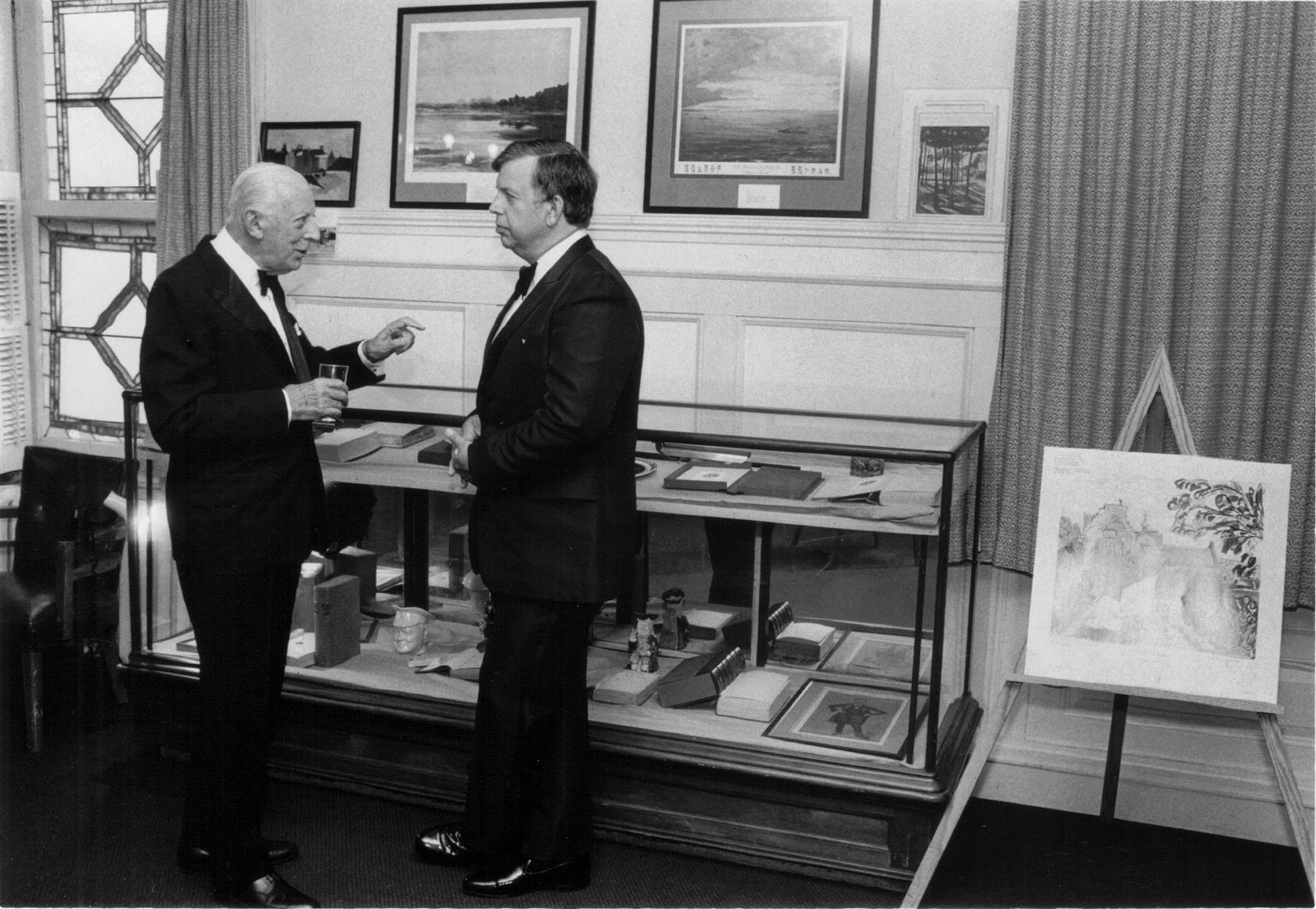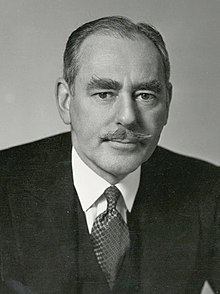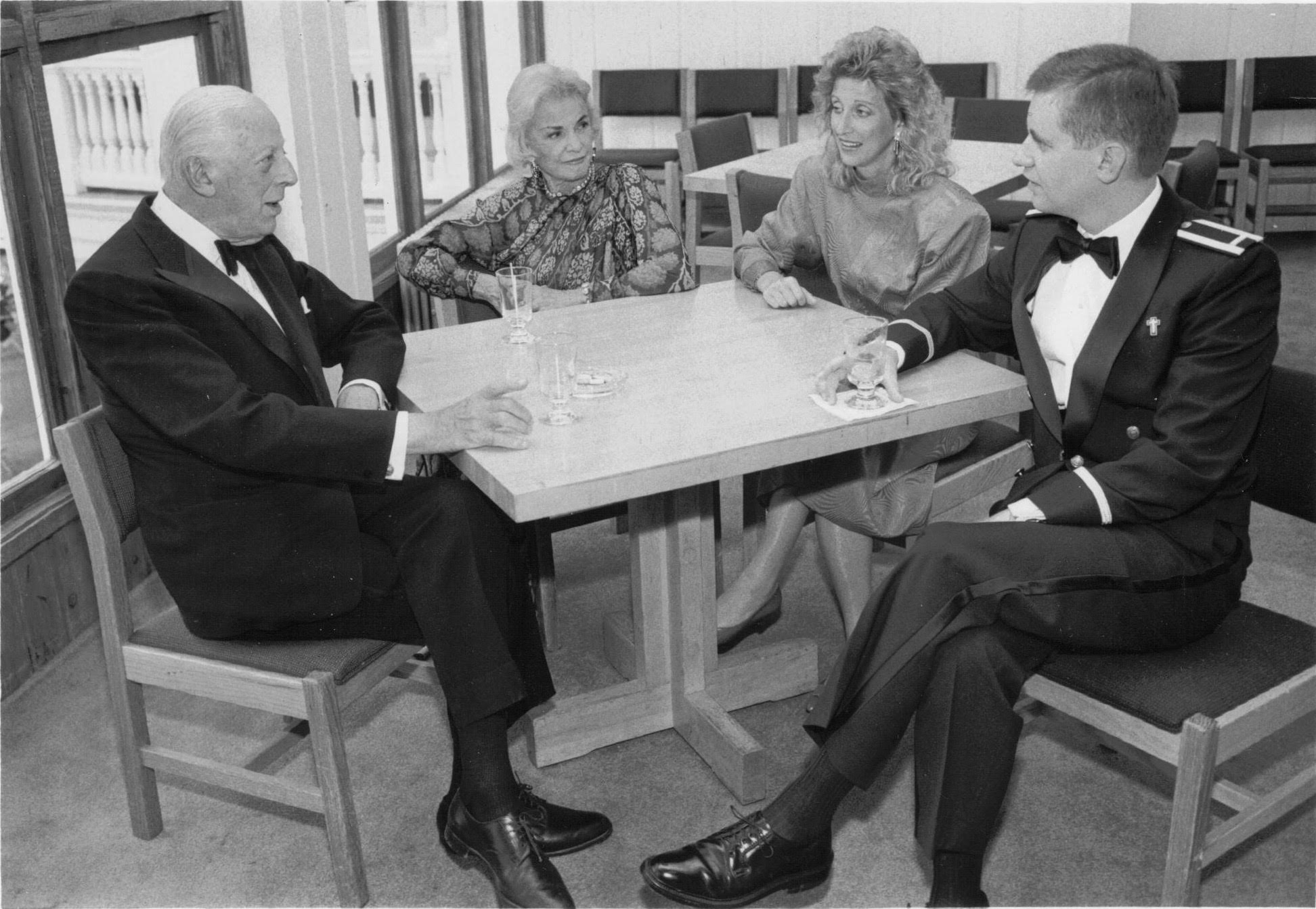
Alistair Cooke: An Introduction and an Appreciation
My previous note was about Alistair Cooke on Churchill in the 1930s. I here reprise my introduction to his 1988 speech, and a personal epilogue. Sir Alistair’s remarks, at the Mount Washington Hotel, Bretton Woods, 27 August 1988, are available by email. RML
Sir Alistair Cooke KBE
When, in what we must regard as a stroke of brilliance, we thought to invite Sir Alistair Cooke to talk about Winston Churchill, we wrote him with trepidation. We were told he had a reputation for being very hard to get.
To our delight, he defied the odds. “This is the time of year when I turn down everything,” he wrote. “But your letter gave me pause. And, after due consideration of all the insuperable obstacles, I am, like the character in Tennyson, ‘saying he would ne’er consent, consented.’ But people who know me only through my intros to ‘Masterpiece Theater’ must wonder what I’m doing talking about Churchill.”
Now we admit, Sir Alistair, that your intros to “Churchill: The Wilderness Years” on “Masterpiece Theater” prompted our invitation. But we also admire your background as a reporter, your grasp of affairs among the English-Speaking Peoples. You’ve conveyed them sensitively back and forth across the Atlantic for fifty years. They caused us to wonder what you personally observed and thought of Winston Churchill.
Here I must note that I advised Sir Alistair not to avoid negatives if he deems them appropriate. As Churchill told an awestruck young editor in the 1930s, “Do not be afraid to criticise, young man—I am a professional journalist.”
Never retire!
Born in Manchester, Alistair Cooke first sighted North America in 1932 at the age of 23. He expected to be here only briefly, but nine years later he became a U.S. citizen. He was American correspondent for The Times of London from 1938 to 1942. United Nations correspondent for the Manchester Guardian, 1945-47. And U.S. correspondent for The Guardian from then until 1972 when he “retired.”
But AC has an important maxim (which I have since vowed to follow). “I shall never retire, because I have observed that most of my friends who do immediately keel over.” Sir Alistair viewed retirement with much the same disdain as Winston Churchill.
So he continues his weekly BBC 15-minute broadcast, “Letter from America.” First beamed only to Britain, it ended up in fifty countries. That started in March 1946, and over the past forty-two years he hasn’t missed a week.
“My entire career from the age of 28 to 79,” he wrote, “has been that of reporting America, first to Britain and then to the rest of the world.” His greatest TV achievement, in 1972, was “America: A Personal History of the United States.” It earned four Emmies and led to his best-selling book, Alistair Cooke’s America.
His acceptance sent me to America and his six or eight other books. I found penetrating observations and a ready wit. But most impressive was the relaxed, contemplative tone with which his audiences are familiar. With Alistair Cooke it is like having an old friend to chat with. When he talks of what Lady Soames called “the storms which have rocked our civilization,” he reminds you of an old saying: “A friend is someone who knows all about you, but likes you.”
The Bomb and the Marshall Plan
Here for example is what Sir Alistair broadcast on 4 August 1970. It was the 25th anniversary of the atomic bombing of Japan.
Without raising more dust over the bleached bones of Hiroshima and Nagasaki, I should like to contribute a couple of reminders. The first is that the men who had to make that decision were just as humane and tortured at the time as you and I were later. And, secondly, that they had to make the choice of alternatives that I for one would not have wanted to make for all the offers of redemption from all the religions of the world.
And here is another, 16 October 1971, on what he called “the magnificent and munificent idea of the Marshall Plan.” Dean Acheson, who largely devised it, had just died, mostly forgotten. AC’s audience largely comprised people who had never heard of Acheson’s scheme:

The Marshall Plan was a vast system of loans and gifts to battered old Europe that made possible, not only her recovery—but also, as Secretary of State Dean Acheson was well aware—the healthy growth of a generation of young Europeans with lungs powerful enough to exercise in withering denunciation of this Secretary, who looked like a Spanish grandee and was, they swore, an American imperialist who had spawned the Marshall Plan as a fat insurance racket.
Churchillian optimist
Though always realistic, Alistair Cooke was the kind of optimist Churchill was. Both sought silver linings to clouds however stormy. His is the quality William Safire recognized, reviewing Sir Alistair’s America Observed: The 1940s to the 1980s. “He interprets America better than any foreign correspondent since Tocqueville.”
My favorite Cooke-book is his Six Men—a rather briefer version of Churchill’s Great Contemporaries.” He knew all six personally: Chaplin, Mencken, Bogart, Adlai Stevenson, Bertrand Russell, and Edward VIII. It is about the latter that I offer my final Cookeism. I’ve dined out on it. Despite many biographies, and the Duke of Windsor’s own apologia, it is an unmatched summary. Everyone who has read Six Men remembers it:
The most damning epitaph you can compose about Edward VIII—as a prince, as king, as a man—is one that all comfortable people should cower from deserving. He was at his best only when the going was good.
(That is rather the opposite of a definition of Winston Churchill.)
Ladies and gentlemen, it is my honor to present, minus cardigan and golf clubs, but equipped by unparalleled experience to remember Sir Winston Churchill, Sir Alistair Cooke, Knight Commander of the Most Excellent Order of the British Empire.
Epilogue

The magic name of Winston Churchill has done a lot for Barbara and me. Among other things, it allowed us to meet memorable people. Alistair Cooke and his wife, Jane White Hawkes, were certainly among them.
The friendship that began in Bretton Woods lasted sixteen years until AC’s death in 2004. We nursed a fulsome correspondence, now among my papers in trust for the Hillsdale College Churchill Project.
Some letters were serious, some jolly, some embarrassing. The worst came when I ran a piece on political cartoonist David Low—entitled “Sidney Low.” Immediately arrived the inevitable rebuke:
Dear Richard: What an unbelievable & utterly appalling error! Like writing a piece about Henry Bernard Shaw or Franklin D. Kennedy! Sidney Low was an editor-journalist of very little fame. David Low was, indeed, the greatest cartoonist of this century. You must apologize openly & profusely. With (otherwise) kind regards – Alistair
The only thing to do was reply in kind:
Dear Algernon: I apologize utterly and profusely. Of course I have all of Low’s books and cartoons, and I knew perfectly well. Bolloxing Christian names is my notorious fault. I am sure that in future I shall never forget the distinguished name of Derek Low as among the greatest scribblers of our time. With regards to you and Janice. Yours ever, Fred Langworth
Christmas at Fifth Avenue
Our last visit was in December 2003, to his Fifth Avenue flat overlooking Central Park. He proudly told us it previously belonged to William Shawn, immortal editor of The New Yorker. “I have been housebound for eighteen months,”AC said, “but I do set aside a half hour in the evening for entertaining friends.” Two hours later we finally left, Alistair ejecting us. “I must eat at a set time every night, or everyone gets upset.”
He was still the man we remembered, stooped and tottery now, but the same witty, brilliant mind. There was the fine grasp of events, the vivacious wife, herself 91 but looking more like 70. An accomplished artist, Jane had set down her brushes. “At the moment I’m into full-time maintenance.”
None of our conversation was what one might expect with a 95-year-old. Nothing about medicine or doctors or age. Alistair spoke of history, past and current. The election campaign; the Howard Dean phenomenon; prospects for President Bush. What would happen in Iraq; how Iraq was formed (with Churchill’s assistance). Thoughtfully, sadly, Alistair juxtaposed the “soft brown eyes” with the hard terror of Osama bin Laden.
A journalist eight decades on the scene, he spoke with panache, and much less reticence than he would in public. (“___ ___ is a horse’s arse.”) He was mulling over his next Letter from America. When he left the room Jane said: “He lives only for the Letter. If he ever has to give that up he will die.”
“Always, triumphantly, in touch”
Not three months later we heard his announcement:
Throughout fifty-eight years I have had much enjoyment in doing these talks. I hope some of it has passed over to the listeners, to all of whom I now say thank you for your loyalty and goodbye.
Alistair had finally retired. And I remembered what he’d said about that.
His friend William F. Buckley, Jr. wrote that Churchill College, hearing that he had “put his feet up,” invited Alistair to be a Trustee. AC replied: “Thank you for your invitation. In about two months, I will put my feet up permanently.” He thought this “very funny, which indeed it was,” Buckley wrote, “very nearly, though not quite, dispelling the gloom in his visitor’s heart.”
His old paper, The Guardian, knew him best:
Was he a great journalist? Just read his coverage of Kennedy in Dallas: the question answers itself. He could reach heights few others could aspire to. But did he—for the millions who tuned in, decade after decade—reflect any America but his own, a mix of nostalgia, Mencken and Rockwell reheated?
That is a harder question…. In extreme old age, the laughing cavalier could do so much more than remember. He could reach back, reach forward: and make the connections. He was always, triumphantly, in touch.
Which for me makes his death no less easy to accept. As Churchill wrote of Arthur Balfour: “I felt also the tragedy which robs the world of all the wisdom and treasure gathered in a great man’s life and experience and hands the lamp to some impetuous and untutored stripling, or lets it fall shivered into fragments upon the ground.”
“Game Called…
…Upon the field of life, the darkness gathers far and wide.
The dream is done, the score is spun, that stands forever in the guide.
Not victory, nor yet defeat, is chalked against the player’s name.
But down the roll, the final scroll, shows only how he played the game.”







2 thoughts on “Alistair Cooke: An Introduction and an Appreciation”
Good evening. That retort is a gem. “My mother… often”.
Wonderful website. A treasure trove, really.
Lovely piece. I had forgotten that The Guardian was Alistair Cooke’s paper. Which, to me, makes what The Guardian has become all the sadder.
Comments are closed.